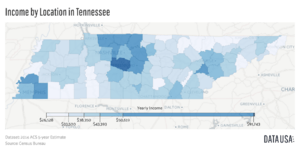Economy of Tennessee facts for kids
Tennessee has a really interesting and varied economy! It's like a big puzzle made of many different pieces. This state is known for many things, including making products, farming, healthcare, and tourism. Big companies like FedEx, which delivers packages all over the world, and AutoZone, a huge car parts store, are based here.
Farming is a very important part of Tennessee's economy. The state grows a lot of soybeans, tobacco, and cotton. Healthcare is also a big deal, especially in Nashville, which is a major center for hospitals and medical research. Millions of people visit Tennessee every year because of its beautiful nature and fun places. Popular spots include the Great Smoky Mountains National Park and the Country Music Hall of Fame.
Contents
Tennessee's Economy in Numbers
In 2020, all the goods and services produced in Tennessee were worth about $364.5 billion. This is called the state's gross state product. In 2019, the average income for each person was about $29,859. The typical household earned about $58,516 in 2021. About 13.9% of the people in Tennessee lived below the poverty line, which is the official income level where people are considered poor.
Tennessee is known as a "right-to-work" state. This means that workers don't have to join a union to get or keep a job. This is common in many Southern states.
How Tennessee Collects Money (Taxes)
Tennessee is famous for being a state with low taxes. It's often ranked as one of the top five states with the lowest tax burden on its residents. One big reason for this is that Tennessee is one of nine states that does not have a general state income tax. This means people don't pay a tax on the money they earn from their jobs.
Instead, the main way the state government gets money is through sales tax. This is a tax you pay when you buy most items. The state's sales tax rate is 7%. This is one of the highest state sales tax rates in the country. However, food is taxed at a lower rate of 4%. Local cities and counties also add their own sales taxes, which can make the total sales tax between 8.5% and 9.75%. This makes Tennessee's average sales tax rate the highest in the nation.
While sales tax helps the state government, property taxes are the main way local governments get their money. Property taxes are paid by people who own land and buildings.
Farming in Tennessee
Tennessee has a lot of farms, ranking eighth in the nation for the number of farms. These farms cover more than 40% of the state's land. Farming brings in about $3.5 billion each year and has a huge impact of $81 billion on the state's economy.
Beef cattle are the biggest farm product in Tennessee. More than half of the state's farmland is used for raising cattle. Soybeans are the most common crop grown, followed by corn and cotton. Most soybeans are grown in West and Middle Tennessee. Broilers (chickens raised for meat) and other poultry are the state's second most common livestock.
Tennessee has been a top tobacco-producing state for a long time, especially in East Tennessee. Springfield, Tennessee is famous for its dark fired tobacco. The state is also a big producer of tomatoes, with Grainger County being a top tomato-growing area. Other important crops include hay, wheat, eggs, and snap beans.
The Nashville Basin is a great place for raising horses. This is because the soil there grows perfect grass for them. The Tennessee Walking Horse, a famous breed, was first developed here. Tennessee also ranks second in the nation for breeding mules and producing goat meat.
Growing plants for gardens and landscaping is also important, especially in Warren County. This area is even called the "Nursery Capitol of the World." Forests cover more than half of Tennessee, and the state is a top producer of hardwood lumber.
Making Things (Industry and Manufacturing)
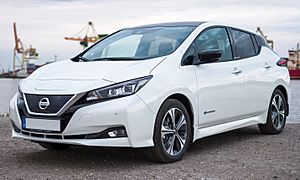
For a long time, Tennessee was mostly about farming. But after World War II, the state started to grow a lot more factories. Chattanooga became one of the first industrial cities in the South, with many factories making iron, steel, and textiles. Today, Tennessee has over 2,400 advanced manufacturing businesses. They produce more than $29 billion worth of goods every year.
Tennessee is now a major center for making cars. The Nissan Smyrna Assembly Plant in Smyrna is the largest car factory in North America! Other car companies like General Motors (in Spring Hill), Van Hool (in Morristown), and Volkswagen (in Chattanooga) also have factories here. Ford is building a huge new factory called Blue Oval City in Stanton. Many companies that make car parts are also located in Tennessee.
Making food and drinks has also been a big industry since the late 1800s. The world's first Coca-Cola bottling plant opened in Chattanooga in 1899. Other well-known brands made in Tennessee include Jack Daniel's, George Dickel, Mountain Dew, Mayfield ice cream, Goo Goo Cluster candies, Moon Pies, Bush's Beans, Little Debbie snacks, M&M's, and Pringles chips.
Tennessee is also a top state for making chemicals. These include things like paints, pharmaceuticals (medicines), and soaps. Eastman Chemical Company, a big chemical company, has its headquarters in Kingsport.
The state also produces many consumer electronics, electrical appliances, and other electrical equipment. Brands like Monogram Refrigeration, Whirlpool, LG Electronics, and Electrolux have made products here.
Big Businesses
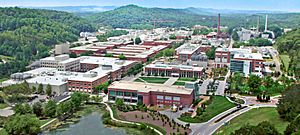
Tennessee is home to many large companies. Some of the biggest service industries are healthcare, transportation, music and entertainment, and banking. Here are a few examples of major companies based in Tennessee:
- FedEx (Memphis)
- AutoZone (Memphis)
- International Paper (Memphis)
- Hospital Corporation of America (Nashville)
- Dollar General (Goodlettsville)
- Tractor Supply Company (Brentwood)
Technology and Research
The research and development industry is a major employer in Tennessee. This is mainly because of the Oak Ridge National Laboratory (ORNL) and the Y-12 National Security Complex in Oak Ridge. ORNL does amazing scientific research in many areas, including new materials, energy, and supercomputing. It's the largest national laboratory in the Department of Energy system.
The area between Oak Ridge and Knoxville is known as the Tennessee Technology Corridor. It has over 500 high-tech companies. The technology sector is also growing fast in the Nashville area. In 2018, Amazon opened a large operations center in Nashville, planning to hire about 5,000 people.
Energy and Minerals
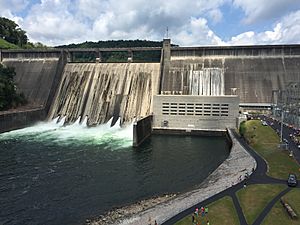
Most of Tennessee's electricity comes from the Tennessee Valley Authority (TVA). In 2020, about 47.3% of the state's power came from nuclear power. Other sources include natural gas, coal, and hydroelectric power (from dams). About 61.3% of the electricity made in Tennessee produces no greenhouse gases, which is good for the environment.
Tennessee has the two newest civilian nuclear power reactors in the U.S. at the Watts Bar Nuclear Plant. Unit 2 started working in 2016, making it the first new nuclear reactor to open in the U.S. in the 21st century. Tennessee was also an early leader in hydroelectric power, building many dams on its rivers. It's the third-largest hydroelectric power-producing state east of the Rocky Mountains.
While Tennessee doesn't have much oil or natural gas, it does have one oil refinery in Memphis. Small amounts of Bituminous coal are mined in the Cumberland Plateau.
Tennessee is the nation's top producer of ball clay, which is used to make ceramics. Other important minerals found here include sand, gravel, crushed stone, and zinc. The Copper Basin in Polk County was a very busy copper mining area for many years.
Tourism and Fun Places to Visit
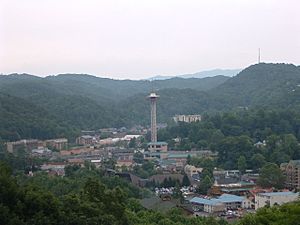
Tourism brings billions of dollars to Tennessee's economy every year! It's the 11th-most visited state in the nation. In 2019, a record 126 million people visited Tennessee. This led to $23.3 billion being spent by tourists. Tourism also supports about 195,000 jobs in the state.
The Great Smoky Mountains National Park is the most visited national park in the U.S., with over 12 million visitors each year. This park is a huge draw for tourists, especially in nearby towns like Gatlinburg and Pigeon Forge. Here you can find attractions like Dollywood (the most visited ticketed attraction in Tennessee), Ober Gatlinburg, and Ripley's Aquarium of the Smokies.
In Memphis, popular places to visit include Graceland (the home of Elvis Presley), Beale Street (famous for music), the National Civil Rights Museum, and the Memphis Zoo.
Nashville has many attractions related to its amazing music history. You can visit Lower Broadway for live music, the Country Music Hall of Fame, the Ryman Auditorium, and the Grand Ole Opry. Other Nashville attractions include the Tennessee State Museum and The Parthenon, a full-scale replica of the ancient Greek temple.
Chattanooga offers fun places like Lookout Mountain, the Chattanooga Choo-Choo Hotel, Ruby Falls, and the Tennessee Aquarium, which is the largest freshwater aquarium in the U.S.
Other cool places to visit around the state include:
- The American Museum of Science and Energy in Oak Ridge.
- The Bristol Motor Speedway in Bristol, a famous race track.
- The Jack Daniel's Distillery in Lynchburg.
- The Hiwassee and Ocoee rivers in Polk County, great for rafting.
Four Civil War battlefields in Tennessee are protected by the National Park Service. These include Chickamauga and Chattanooga National Military Park and Shiloh National Military Park. The Big South Fork National River and Recreation Area is a beautiful natural area in northeastern Tennessee.
Tennessee also has many scenic drives, like the Natchez Trace Parkway, and 45 state parks that cover a lot of land. The many lakes created by TVA dams also offer great places for boating, fishing, and other water activities.
|
 | Selma Burke |
 | Pauline Powell Burns |
 | Frederick J. Brown |
 | Robert Blackburn |


